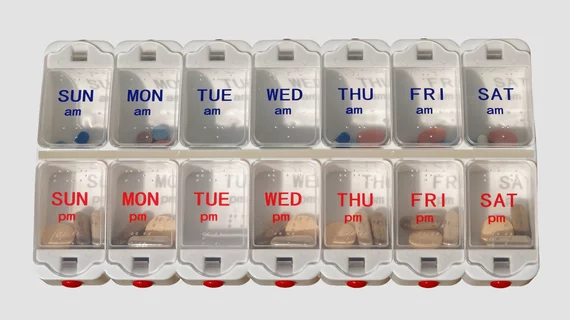Warfarin after TAVR is safe, but fails to boost outcomes
Prescribing warfarin to patients after transcatheter aortic valve replacement (TAVR) is not associated with statistically significant benefits, according to new research published in the American Journal of Cardiology.[1]
The study’s authors explored data from 94 low-risk TAVR patients with symptomatic severe aortic stenosis. Each patient underwent transfemoral TAVR from July 2018 to October 2019 at one of seven facilities in the United States. While they were all prescribed low-dose aspirin after TAVR, 44 patients were randomly selected to also take warfarin therapy for 30 days.
In addition, the team tracked data from a group of 30 patients who either presented with a pre-existing indication for oral anticoagulants (OACs) or a contraindication that told clinicians they should not be prescribed warfarin.
Overall, when combining the randomized study cohort and these additional “as-treated” patients, the analysis included 66 patients treated with warfarin and low-dose aspirin and 57 patients treated with just low-dose aspirin. The mean patient age for both groups was approximately 73 years old. Echocardiograms and CT scans were performed to track patient health and evaluated by independent radiologists.
After two full years, there was no significant difference in the study’s primary endpoint—a composite of mortality, stroke and myocardial infarction—between the two groups. Also, there were no differences in mean pressure gradients or peak velocity. Researchers identified no cases of severe structural valve deterioration (SVD) after two years, but there were two cases of moderate SVD, both in the group that did not take warfarin.
This study did have certain limitations. For instance, after the initial 30 days of warfarin therapy, it was up to clinicians if the patient should continue taking warfarin. As one might expect, this led to certain “variations” that could have influenced the group’s findings. Another limitation worth highlighting was the fact that only short-term safety was evaluated; this mean the long-term safety implications of post-TAVR warfarin therapy are unclear.
“In low-risk patients who underwent TAVR, short-term anticoagulation with warfarin was safe, without excess bleeding; however, compared with aspirin alone, it did not impact the clinical or echocardiographic outcomes at 24 months,” wrote corresponding author Ilan Merdler, MD, an interventional cardiology fellow at the MedStar Heart & Vascular Institute in Washington, D.C, and colleagues. “Larger prospective studies with warfarin and nonvitamin K antagonist OACs are needed to confirm the safety and potential benefit of OAC after TAVR.”
The full study is available here.

